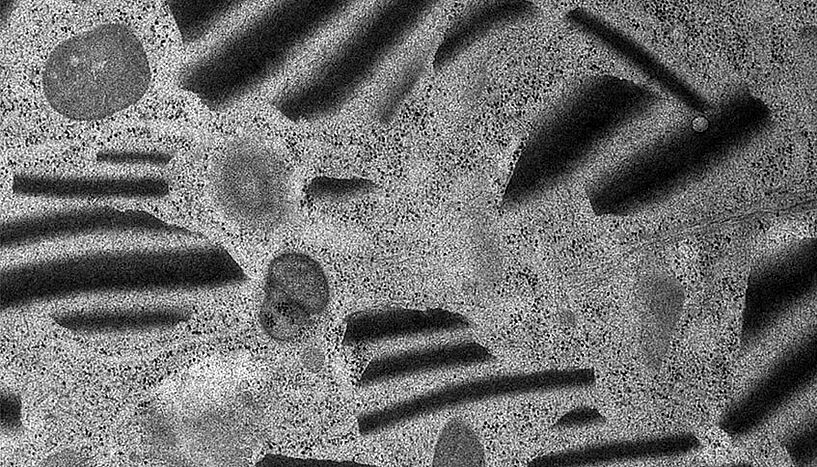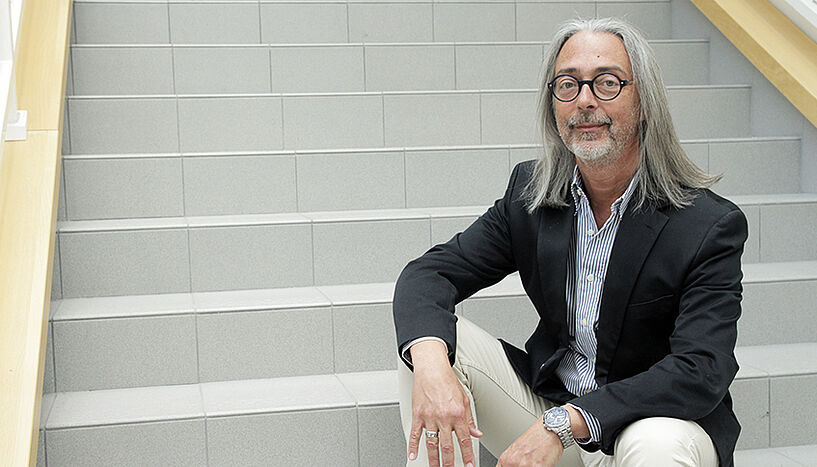Health treatment through chemical synthesis
| 02. November 2017
"Working in pharmaceutical chemistry, our primary objective is to prepare molecules to tackle health issues" – Vittorio Pace is group leader in Synthetic Chemistry at the University of Vienna. (Photo: rizenagard/pixabay/CC0)
Introducing molecular complexity through the shortest possible route – this is the daily business of Vittorio Pace. In an interview with uni:view, the pharmaceutical chemist explains what this means exactly, what his latest achievements are and how they contribute to solving serious health issues.
uni:view: Vittorio Pace, your main research activity is the development of synthetic tactics and their application in synthetic medicinal chemistry. What do you do exactly?
Vittorio Pace: My group is actively engaged in introducing new concepts in chemical synthesis: in particular, we look at establishing protocols that would allow to reach a given molecular target selectively. By applying these procedures to the synthesis of drug analogues, a rapid and straightforward access can be envisaged.
uni:view: The results of your group were recently published in two journals that rank among the most well-reputed journals in the field of chemical sciences – what are your latest achievements?
Pace: In a paper published by Angewandte Chemie we described an experimentally simple procedure enabling the formation of a chemically useful, densely functionalized aldehyde. The methodology relies on three chemical events, which – upon fine-tuning the reaction conditions – could be properly modulated and thus happen in just a single synthetic operation. This is quite remarkable because of the wide (commercial) availability of the starting materials and it compares highly favorably to previously reported methods.
In another paper published by JACS we describe the introduction of the first direct nucleophilic fluoromethylation of carbon species. Fluorine – probably the most fascinating halogen – is quite difficult to introduce into an organic framework and requires complex synthetic strategies to reach the goal. Our tactic is conceptually extremely simple and selective and therefore forms the basis for initiating a completely new perspective to bring fluorine into molecules.
uni:view: Why is you research important for the field?
Pace: Commonly found drawbacks in organic synthesis are the lack of selectivity (i.e. a reagent can contemporaneously attach to different sites) and the complexity of experimental procedures (e.g. long protocols for formally realising a unique – desired – transformation). Our research philosophy is focused on introducing molecular complexity through the shortest possible route. In fact, allowing a chemical process to occur under full control implies the decrease (or ideally the elimination) of redundant, unnecessary steps. Both these papers share the use of chameleonic reagents – called carbenoids – which, depending on the reaction conditions, can switch their chemical properties. It is like a tailor-made chemistry in which the operator can determine – ab initio – the final outcome by fixing these experimental conditions.
uni:view: …and for society?
Pace: Organic synthesis is of paramount importance in modern chemistry and biology: without it, there is almost no possibility to provide pharmacologically active substances to society. As such, we should all be aware of its pivotal role in science. Establishing new efficient and high-yielding methods for chemical synthesis would finally provide highly reliable avenues for preparing drugs. Additionally, reducing synthetic routes to only the strictly necessary steps brings considerable advantages in terms of waste production and in terms of the time required. While the latter can be easily justified by the substantial decrease of experimental procedures, the former should be considered in broad terms: there is no doubt that chemistry produces environmentally non-benign substances. This is particularly true in the case of purification sequences (e.g. chromatography) involving oil derivatives which are thrown away afterwards. In this context, limiting the number of steps and rendering each one more efficient would enable us to decrease the negative impact of chemistry on the environment.
uni:view: Where do we "see" results of your research in everyday life?
Pace: Working in pharmaceutical chemistry, our primary objective is to prepare molecules to tackle health issues. We recently accomplished an alternative synthesis of a very important HIV-protease inhibitor employed in the treatment of AIDS. Analogously, we are working – inter alia – on the development of novel agents for CNS (epilepsy and anxiety) and cancer pathologies. These compounds have been designed at the Center of Pharmacy of the University of Vienna by the research groups of Thierry Langer, Gerhard Ecker and Steffen Hering. My research team prepares the libraries of compounds which will then be employed in biological tests. We ultimately look at transferring our synthetic knowledge and expertise to help solve serious health issues.
uni:view: What is the fascinating part about your research?
Pace: Every day, I learn something I did not know before. It is very stimulating work, which is a continuous source of inspiration to pursue the next objectives and look critically at the results obtained. Undoubtedly, the serendipity factor adds a veil of mystery to the investigations: it is not rare at all that we observe unexpected products arise from reactions, which we would have never considered at the beginning. It is then my job to rationalise it and understand its potentialities and limitations in depth. For example, the case documented in the Angewandte Chemie paper is based on a completely unforeseen transformation, which was the unique key event taking place during investigations that focused on obtaining different compounds. In the end, the experimental outcome was even more versatile and appealing than the process we were interested in at the beginning.
uni:view: Thank you for the interview. (hm)
Since August 2014, Vittorio Pace has been group leader in Synthetic Chemistry at the Department of Pharmaceutical Chemistry led by Thierry Langer. His research interest is the development of synthetic tactics and their application in synthetic medicinal chemistry. (Foto: Marta Ruiz)
The publication "Efficient Access to All-Carbon Quaternary and Tertiary α-Functionalized Homoallyl-type Aldehydes from Ketones" (authors: Vittorio Pace, Laura Castoldi, Eugenia Mazzeo, Marta Rui, Thierry Langer, and Wolfgang Holzer) was published on 1 September 2017 in "Angewandte Chemie" (applied chemistry).
The publication "Exploiting a 'Beast' in Carbenoid Chemistry: Development of a Straightforward Direct Nucleophilic Fluoromethylation Strategy" (authors: Giovanna Parisi, Marco Colella, Serena Monticelli, Giuseppe Romanazzi, Wolfgang Holzer, Thierry Langer, Leonardo Degennaro, Vittorio Pace, and Renzo Luisi) was published on 11 September 2017 in "JACS".




